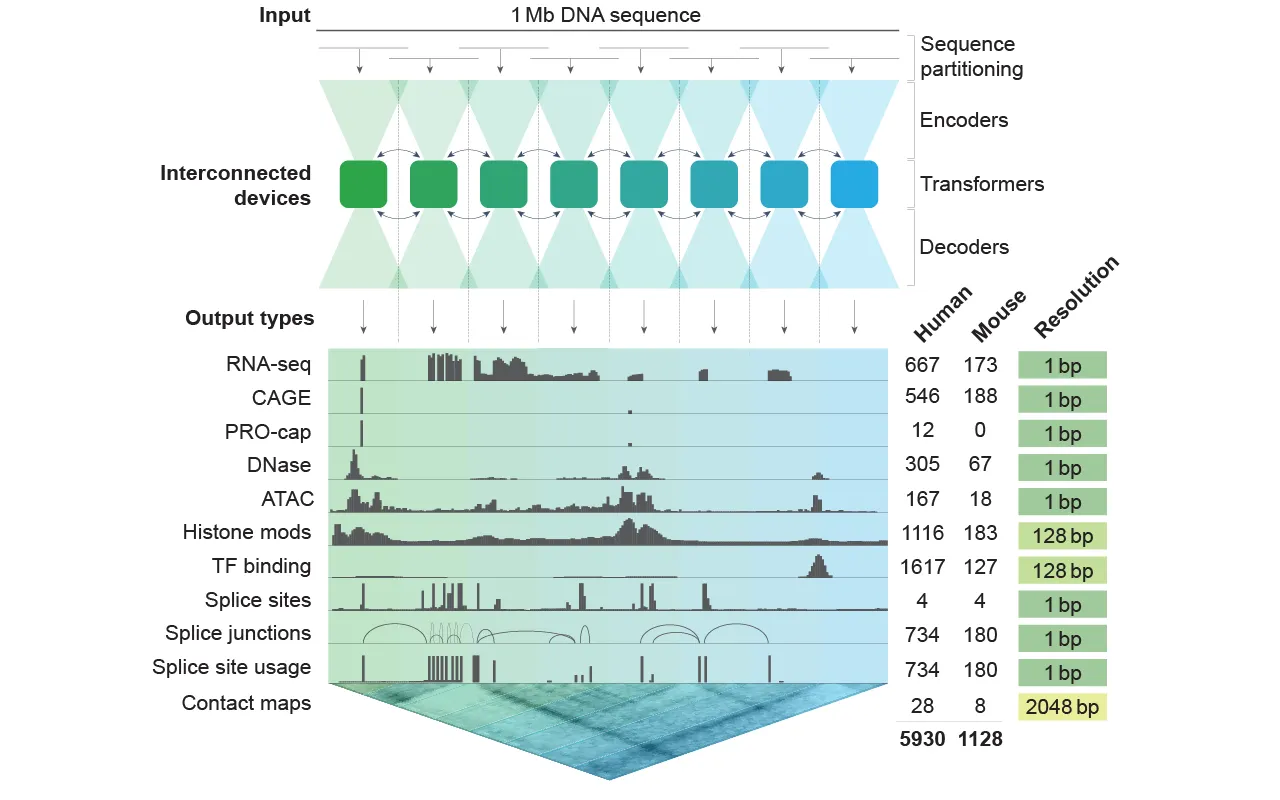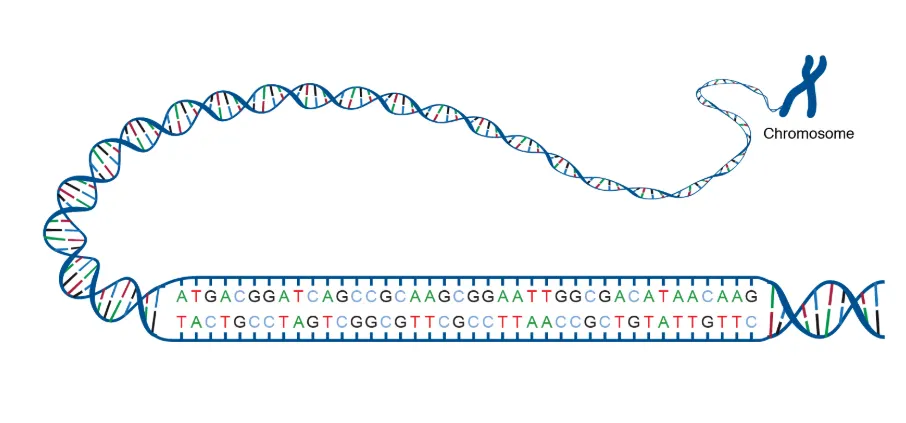In brief
- AlphaGenome processes up to 1 million base pairs at once, outperforming older models in 46 out of 50 benchmark tests for regulatory and variant prediction.
- Built with just 450M parameters, its lightweight U-Net transformer decodes the non-coding genome, enabling disease research and personalized medicine.
- Google’s model is available to researchers via API, signaling a new era of more open and accessible genomics.
Google DeepMind’s AlphaGenome, which was announced today, isn’t just another entry in the AI-for-science arms race. With API access available for non-commercial research—and extensive documentation and community support hosted on GitHub—it signals that genomics, once confined to specialized labs and paywalled datasets, is moving rapidly toward open science.
This is a pretty big deal.
Imagine your DNA is like a giant instruction manual for how your body works. For a long time, scientists could only really understand the parts that directly told your body how to build things, like proteins. But most of your DNA—over 90% of it—isn’t like that. It doesn’t build anything directly. People used to call it “junk DNA.”
Now we know that “junk” is actually doing something important: it helps control when and where the real instructions are used—kind of like a control panel full of switches and dials. The problem? It’s really hard to read and understand.
That’s where AlphaGenome comes in.
AlphaGenome is a powerful AI model built by Google DeepMind that can read these confusing parts of DNA better than anything before it. It uses advanced machine learning (like the kind behind image generators or chatbots) to look at huge sections of DNA—up to a million letters long—and figure out which parts are important, how they affect your genes, and even how mutations might lead to disease.
It’s kind of like having a super-smart AI microscope that not only reads the manual, but figures out how the whole system turns on and off—and what happens when things go wrong.
What’s cool is that DeepMind is sharing this tool through an API (a way for computers to talk to it), so scientists and medical researchers around the world can use it for free in their research. This means it could help speed up discoveries in things like genetic diseases, personalized medicine, and even anti-aging treatments.
In short: AlphaGenome helps scientists read the parts of our DNA we didn’t understand before—and that could change everything about how we treat disease.
AlphaGenome is a deep learning model designed to analyze how DNA sequences regulate gene expression and other critical functions. Unlike older models that parsed short DNA fragments, AlphaGenome can process sequences up to one million base pairs long—an unprecedented scale that allows it to capture distant regulatory interactions missed by previous methods.
AlphaGenome’s core strength is its multimodal prediction engine. Unlike previous models that could predict one type of genomic activity, this model outputs high-resolution forecasts for gene expression (RNA-seq, CAGE), splicing events, chromatin states (including DNase sensitivity and histone modifications), and 3D chromatin contact maps.
That makes it useful not only for pinpointing which genes are turned on or off in a cell, but for understanding the complex choreography of genome folding, editing, and accessibility.

The architecture is notable, but still pretty familiar if you have been using Stable Diffusion or a normal open-source LLM locally: AlphaGenome uses a U-Net-inspired neural network, with about 450 million trainable parameters.
Yes, that is pretty low if you match it against even the weak and smaller language models that work with billions of parameters. However, considering that DNA only deals with 4 bases and only two pairs—basically the entire human genome is nothing but a combination of 3 billion pairs of A-T and C-G pairs of letters—it is a very specific model, designed to do one single thing extremely well.

The model has a sequence encoder that downsamples input from single-base resolution to coarser representations, then the transformer model layers long-range dependencies before the decoder reconstructs outputs back to the single-base level. This enables predictions at various resolutions, allowing for both fine-grained and broad regulatory analyses.
The model’s training relied on a wide array of publicly available datasets, including ENCODE, GTEx, 4D Nucleome, and FANTOM5—resources that collectively represent thousands of experimental profiles across human and mouse cell types.
And this process was also quite fast: using Google’s custom TPUs, DeepMind completed the pre-training and distillation process in just four hours, using half the computational budget required by its predecessor, Enformer.
AlphaGenome outperformed state-of-the-art models in 22 out of 24 sequence prediction tests and 24 out of 26 variant effect predictions, a rare clean sweep in benchmarks where incremental improvements are the norm. It does the job so well, in fact, that it can compare mutated and unmutated DNA, predicting the impact of genetic variants in seconds—a critical tool for researchers mapping disease origins.
This matters, because the non-coding genome contains many of the regulatory switches that control cell function and disease risk. Models like AlphaGenome are revealing how much of human biology is governed by these previously opaque regions.
AI’s influence on biology today is hard to ignore. Take Ankh, a protein language model developed by teams from the Technical University of Munich, Columbia University, and the startup Protinea. Ankh treats protein sequences like language, generating new proteins and predicting their behavior—similar to how AlphaGenome translates the regulatory “grammar” of DNA.
Another adjacent tech, Nvidia’s GenSLMs, demonstrates AI’s ability to forecast viral mutations and cluster genetic variants for pandemic research. Meanwhile, the use of AI to foster advances in chemical and gene-based anti-aging interventions highlights the intersection of genomics, machine learning, and medicine.
One of AlphaGenome’s most significant contributions is its accessibility. Rather than being restricted to commercial applications, the model is available via a public API for non-commercial research.
While it is not fully open sourced yet—meaning researchers can’t download and run or modify it locally—the API and accompanying resources allow scientists worldwide to generate predictions, adapt analyses for various species or cell types, and provide feedback to shape future releases. DeepMind has signaled plans for a broader open-source release down the line.
AlphaGenome’s ability to analyze non-coding variants—the area where most disease-linked mutations are found—could unlock new understanding of genetic disorders and rare diseases. Its high-speed variant scoring also supports personalized medicine, where treatments are tailored to an individual’s unique DNA profile.
For now, the non-coding genome is less of a black box, and AI’s role in genomics is set only to expand. AlphaGenome may not be the model to take us to Huxley’s “Brave New World,” but it’s a clear sign of where things are headed: more data, better predictions, and a deeper understanding of how life works.
Generally Intelligent Newsletter
A weekly AI journey narrated by Gen, a generative AI model.







